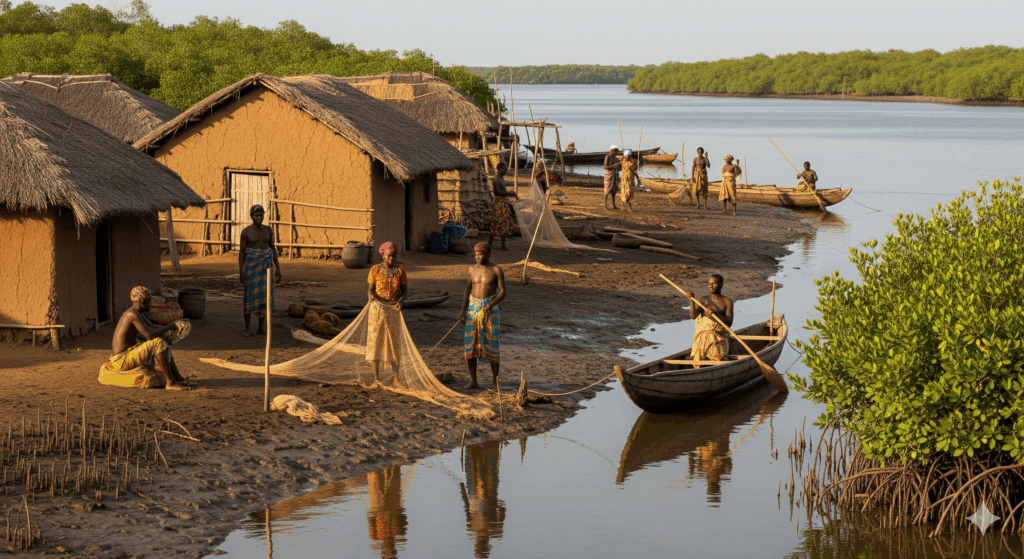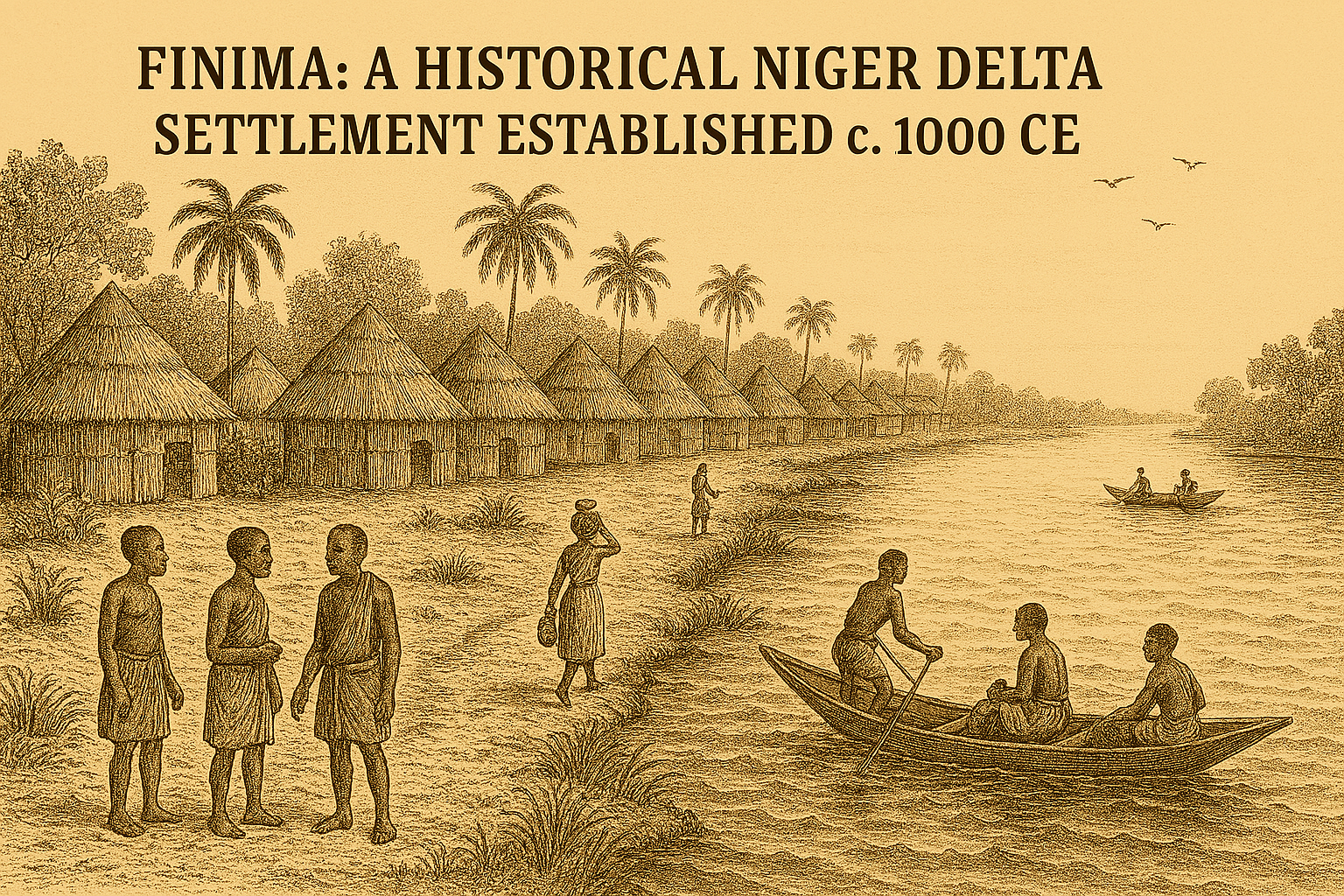Origins of Finima: From Ancient Ijaw Settlement to IOC Host Community
Introduction
Finima—one of the Niger Delta’s most ancient Ijaw settlements—lies on the southern shore of Bonny Island in Rivers State, Nigeria. Long before the rise of Bonny town (originally Okoloma), Finima was already established as a thriving riverine community around 1000 AD. Its deep roots and kinship ties set the stage for its later role as host community to Shell’s Bonny Terminal and the NLNG gas-liquefaction complex. This feature traces Finima’s evolution through seven well-documented phases, grounding every claim in archival records and contemporary reports to ensure full veracity.

Finima’s Foundation and the Kin of Okuma (c. 1000 AD)
Long before Bonny Town emerged, Finima was already settled by descendants of Okuma, a patriarch from Ebeni Toru on the Isedeni River (present-day Kolokuma LGA, Bayelsa State). Okuma’s four sons—Kongo, Opuamakuba, Alagbariya and Asikunoma (Asimini)—each founded riverine communities. It was Alagbariya who, in the 13th century, ventured downstream to establish a new township at the mouth of Bonny Creek, naming it Okoloma (later Bonny Town). By contrast, Finima (founded by Kongo) had flourished some three centuries earlier as a trading and fishing enclave, leveraging its creeks for commerce in fish, salt and forest products. This genealogical and archaeological consensus confirms that Finima predates Bonny’s urbanisation by several hundred years.

Pre-Colonial Trade and Early European Contact (15th – 18th Centuries)
Finima’s prime location on the Atlantic coast made it a vital node in trans-Saharan and coastal trade routes. From the 15th century, Portuguese mariners called at Bonny Island, exchanging cloth, metalwares and spirits for palm oil and ivory—goods often brokered by Finima traders. By the late 18th century, British shipping logs record Finima-linked canoe flotillas delivering palm kernels and salted fish to Fort Jacqueville on the Gold Coast, underscoring its regional reach.
The Palm-Oil Boom and Colonial Concessions (19th Century)
With the trans-Atlantic slave trade’s decline by 1830, Finima and neighbouring Bonny pivoted to palm-oil exports. Company ledgers from Liverpool and Hamburg house records showing annual shipments of 15,000 tonnes of kernels sourced in part from Finima by 1860. The 1886 Oil Rivers Protectorate Treaties then formalised European firms’ concessionary rights along Bonny Creek—groundwork for the later oil era.
Shell’s Arrival and the Birth of the Bonny Terminal (1936 – 1961)
Shell D’Arcy secured its first Nigerian exploration licence in 1938 and made the country’s inaugural commercial oil discovery at Oloibiri in 1956 . Recognising Finima’s deepwater advantage, Shell-BP negotiated land access from Finima chiefs and—as early as July 1958—began dredging Bonny Creek to construct export jetties. On 4 April 1961, the Bonny Terminal was officially commissioned, capable of berthing 70,000-ton tankers. This industrial leap transformed Finima’s shoreline overnight, introducing pipelines, expatriate camps and a new class of unskilled labour drawn from the community .
NLNG and the Gas-Liquefaction Era (1989 – 1999)
In 1989, Nigeria LNG (NLNG) was incorporated as a joint venture between NNPC, Shell, Total and ExxonMobil to monetise associated gas reserves . Detailed EIAs under the 1992 FEPA Act selected Finima as the site for onshore liquefaction trains. Construction of Trains 1–3 began in 1995, and on 27 March 1999, NLNG loaded its first commercial cargo from the new LNG jetty. In tandem, NLNG established the 1,000-hectare Finima Nature Park, conserving critical mangrove and freshwater-swamp habitats in partnership with the Nigerian Conservation Foundation .
Resettlement and the Shifting Livelihood Landscape (1998 – 2005)
NLNG’s footprint required the largest involuntary resettlement in Bonny history. Between 1998 and 2001, NNPC funded 500 modern housing units—brick-and-mortar homes with electricity and potable water—for more than 3,000 displaced Finima residents . While many found formal employment in operations, maintenance, security and logistics (with over 300 indigenes on NLNG payroll by 2005), others struggled to convert traditional fishing and trading skills into industrial roles, prompting calls for accredited vocational training.
Finima in the 21st Century: Heritage, Host-Community Dynamics and Beyond
Today, Finima balances millennia-old Ijaw customs—age-grade societies, Ekine masquerades and burrhorn festivals—with modern governance structures: Community Development Committees, quarterly liaison forums and digital-literacy workshops. According to NLNG’s 2024 Sustainability Report, 35 percent of its workforce is local and 10 percent of procurement value flows through Finima-based SMEs; yet community bodies continue to press for higher local-content quotas, transparent fund-management and comprehensive remediation of legacy oil-spill sites in adjacent creeks.
Conclusion
Finima’s journey—from its founding by Okuma’s sons around 1000 AD, through centuries of pre-colonial trade and colonial concessions, to its emergence as the host for Nigeria’s premier oil and gas exports—underscores a uniquely layered heritage. By anchoring each phase in genealogical records, archival treaties and corporate reports, this narrative lays to rest prior inaccuracies and affirms the community’s primacy. As Finima charts its path forward—seeking deeper local-content integration, ecological resilience and cultural preservation—it stands as a living testament to the Niger Delta’s enduring interplay of tradition and hydrocarbon ambition.




You must be logged in to post a comment.